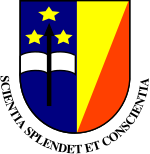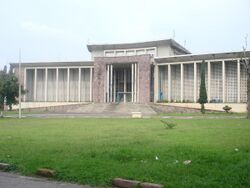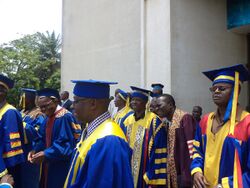Organization:University of Kinshasa
Université de Kinshasa | |
 | |
| Motto | Scientia Splendet et Conscientia Latin: "Science shines and so does conscience" |
|---|---|
| Type | Public |
| Established | 1954 |
| Rector | Jean-Marie Kayembe (since 2021) |
Academic staff | 1,929[1] |
| Students | 29,554[1] |
| Location | , Congo |
| [[Social:School colors|Template:ColourboxTemplate:ColourboxTemplate:Colourbox Red, yellow and blue|u}}rs]] | Template:ColourboxTemplate:ColourboxTemplate:Colourbox Red, yellow and blue |
| Website | www |
The University of Kinshasa (French: Université de Kinshasa), commonly known as UNIKIN, is one of the three major universities in the Democratic Republic of the Congo, together with the University of Kisangani and University of Lubumbashi. Originally founded in 1954 as Lovanium University during Belgian colonial rule, the current university was established following the division of the National University of Zaire (UNAZA) in 1981. The university is located in Kinshasa's Lemba commune.
The university had an enrollment of 29,554 and a faculty and research staff of 1,929 in the 2018–19 academic year,[1] and currently has twelve academic divisions.[2] The Notre-Dame de la Sagesse is strategically located on the campus and provides pastoral ministries to professors and students.
Campus
The university is located about 25 kilometres (16 mi) south of central Kinshasa, in the suburb of Lemba.
Many of the campus facilities have deteriorated and are in poor condition, or lack proper instructional tools - in 2003, the science library had as few as 300 titles in its collection. Since 2001, the university has hosted Cisco Academy, a joint project sponsored by the American software company Cisco and the United Nations Development Programme. The academy focuses on providing recent technology, training students to install and operate computer networks and all coursework is online.[3] The university does not feature in any university rankings.[4]
History
Lovanium University
The university was established in 1954 as Lovanium University by Belgian colonial authorities following criticism that they had done too little to educate the Congolese people. The university was originally affiliated with the Catholic University of Leuven in Belgium. When it opened, the university received heavy subsidies from the colonial government[5] and funding from the Ford Foundation, the Rockefeller Foundation and the United States Agency for International Development and was lauded as the best university in Africa.[6]
National University of Zaire
In August 1971, the university was merged with the Protestant Autonomous University of Congo (Université Libre du Congo) and The University of Congo at Lubumbashi (founded in 1956) into the National University of Zaire (Université Nationale du Zaïre, UNAZA). Ties were cut with the Catholic University of Leuven, and funding for the university began to drop precipitously. At this point, the university had an enrollment capacity of just 5,000.[5]
The decision to merge the private universities into one centralized system was made, at least partially, to counter concerns about political demonstrations on campuses. The entire higher education system was run by a single rector and faculty and staff were put on the federal payroll.[5]
By 1981, the centralized system became too burdensome and the decision was made to re-establish the three separate institutions: the University of Kinshasa, Kisangani University, and the University of Lubumbashi.
Decline in funding
Newly independent, the University of Kinshasa continued to struggle financially throughout the 1980s. By 1985, the campus was in decline, strewn with trash and the dormitories in poor condition. The university's cafeteria stopped serving meals and pay for professors slipped as low as $15.[6]
In response to declining government funds, tuition was raised 500 percent in 1985,[7] and in 1989, deeper cuts were made, with the suspension of nearly all scholarships and financial aid and institution of new fees. Through the 1980s, as much as 90 percent of the university's budget was paid for by the government, with only a small amount of revenues coming from student tuition. By 2002, the government only contributed $8,000 (USD) of the university's estimated $4.3 million annual budget (not including some personnel costs which are paid directly by the state).[5]
Nuclear reactor
The first nuclear reactor in Africa was built at the University of Kinshasa in 1958. The reactor, known as TRICO I, is a TRIGA reactor built by General Atomics. TRICO stands for a combination of TRIGA or “Training Isotopes General Atomic” and Congo.[8] The reactor was built while the country was still under Belgian control, and with the assistance of the United States government, under the Atoms For Peace program. TRIGA I was estimated to have a 50-kilowatt capacity and was shut down in 1970. In 1967, the African Union established a nuclear research center, the Regional Center for Nuclear Studies and the United States agreed to provide another TRIGA reactor. The second reactor, TRICO II, is believed to have a one-megawatt capacity and was brought online in 1972.[9]
In 2001, the TRICO II reactor was reported to be operational,[9] but was apparently put on standby in 1998.[10] The government of the Democratic Republic of Congo stopped funding the program in the late 1980s, and the United States has since refused to ship replacement parts.
International observers have long been concerned about the safety and security of the two nuclear reactors and the enriched uranium they contain.
Faculties and divisions
There are twelve academic divisions at the university:[2]
- Faculty of Arts and Humanities
- Faculty of Law
- Faculty of Economics and Management
- Faculty of Social Sciences Policy and Administrative
- Faculty of Engineering
- Faculty of Science
- The following subjects are available to study in the Faculty of Science: Physics, mathematics, computer science, biology, chemistry, geology.
- Faculty of Agricultural Sciences
- Faculty of Psychology and Educational Sciences
- Faculty of Medicine
- The following subjects are available to study in the faculty of medicine: biological medicine, physical medicine and dentistry.
- Faculty of Pharmaceutical Sciences
- Faculty of Veterinary Medicine
- Faculty of Petrochemistry and Renewable Energies
Public figures
Former teachers
- Marcel Lihau, lawyer
- Mabi Mulumba, Congolese politician
Notable alumni
- Didier Etumba, Congolese military officer
- Sylvestre Ilunga, Congolese politician
- Steve Wembi, Congolese criminologist and investigative journalist
- Webe Kadima, Congolese academic
- Emmanuel Ramazani Shadary, Congolese politician
- Alain Daniel Shekomba, Congolese businessman, politician and physicist
- Jacqueline Penge Sanganyoi, Congolese politician
References
- ↑ 1.0 1.1 1.2 "Université de Kinshasa". Southern African Regional Universities Association. http://www.sarua.org/?q=uni_Universit%C3%A9%20de%20Kinshasa.
- ↑ 2.0 2.1 "Facultés" (in fr). University of Kinshasa. http://www.unikin.cd/index.php?page=facultes.
- ↑ "Light in the Harvard of darkness", Economist: 41, July 5, 2003
- ↑ The Times Higher Education University Rankings 2019
- ↑ 5.0 5.1 5.2 5.3 World Bank (2005). Education In the Democratic Republic of Congo. Washington, D.C.: World Bank Publications. pp. 102–122. ISBN 9780821361214.
- ↑ 6.0 6.1 Greenhouse, Steven (June 2, 1988). "Kinshasa Journal; Hunger Competes With a Thirst for Knowledge". The New York Times (New York): pp. Section A; Page 4, Column 3; Foreign Desk.
- ↑ Greenhouse, Steven (May 22, 1985). "18 Months of Harsh Austerity Bring Indications of a Turnaround to Zaire; High Price Exacted By Lauded Reforms". The Washington Post (Washington, D.C.): pp. First Section; A23.
- ↑ 1952-2002 SCK•CEN. ISBN 9076971056. http://www.sckcen.be/en/content/download/1259/27403/file/BrochureSCK50_UK.pdf.
- ↑ 9.0 9.1 "Congo Special Weapons". globalsecurity.org. http://www.globalsecurity.org/wmd/world/congo/index.html.
- ↑ McGreal, Chris (November 23, 2006). "Missing keys, holes in fence and a single padlock: welcome to Congo's nuclear plant". London: The Guardian. https://www.theguardian.com/world/2006/nov/23/congo.chrismcgreal.
Further reading
- Tsakala Munikengi, Télésphore; Bongo-Pasi Moke Sangol, Willy (2004). "The Diplomatic Paradox: University of Kinshasa between Crisis and Salvation". in Trefon, Theodore. Reinventing Order in Congo: How People Respond to State Failure in Kinshasa. London: Zed Books. pp. 82–98. ISBN 1842774905.
External links
- Homepage of the University of Kinshasa (in French)
[ ⚑ ] 4°25′10″S 15°18′35″E / 4.41944°S 15.30972°E
 |



